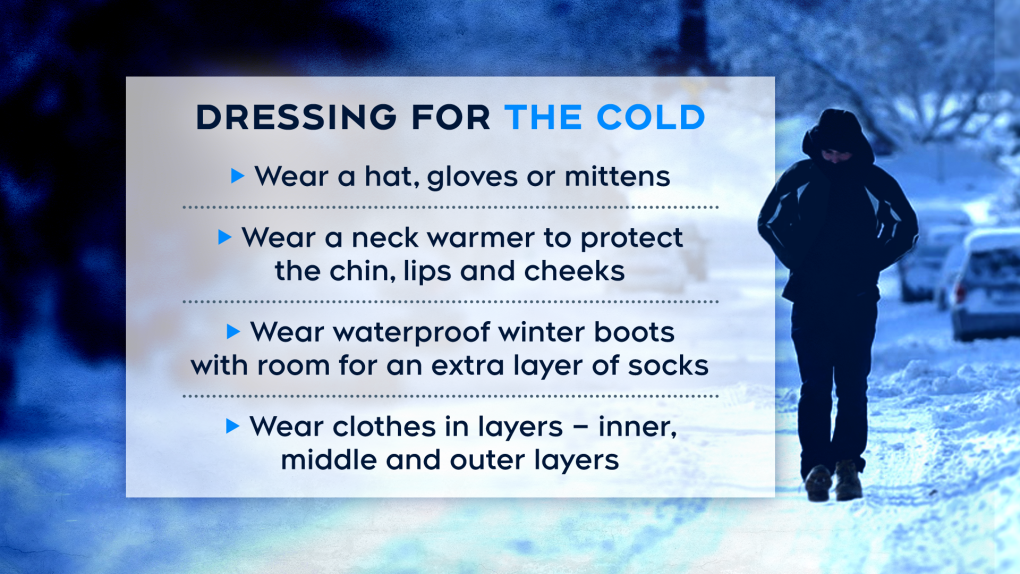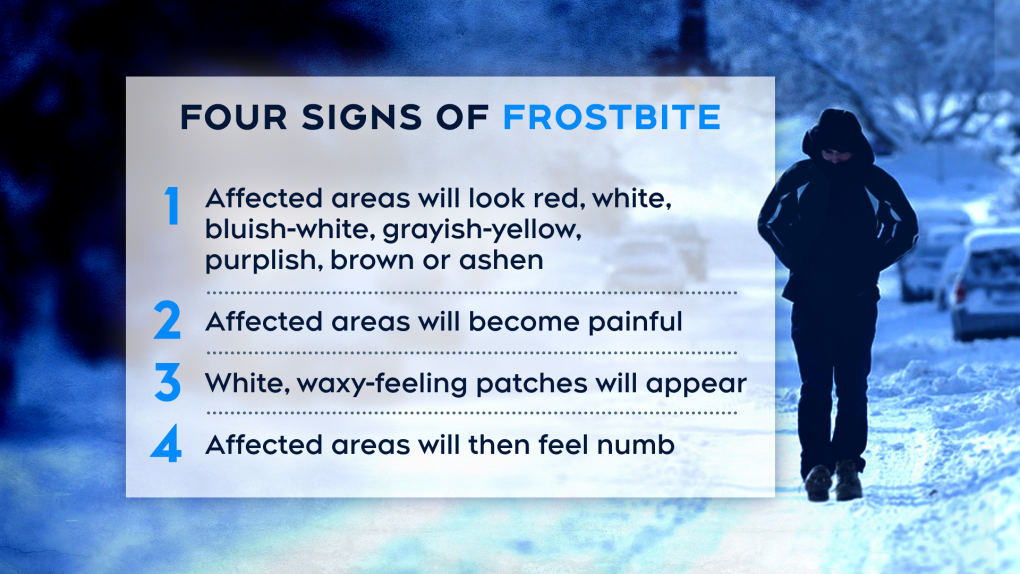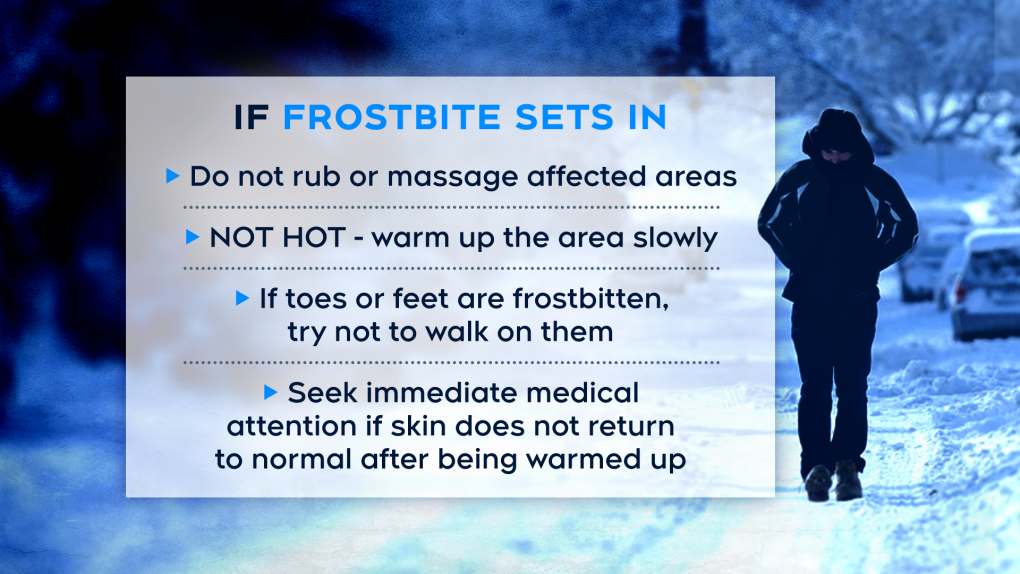Tips to stay safe in cold weather
A cold snap is bringing the lowest temperatures so far this winter to Ottawa.
And while Ottawa might not take the crown for the absolute coldest capital city on Earth (a title held by Ulaanbaatar, Mongolia), the temperatures this week — not to mention the wind — can still present risks, especially if you're not used to them.
- Sign up now for daily CTV News Ottawa newsletters
- The information you need to know, sent directly to you: Download the CTV News App
Ottawa Public Health says it's important to get outdoors, even on the coldest days, to enjoy winter activities like skating, skiing, sledding and snowshoeing, but you have to be prepared to avoid falling victim to things like frostbite and hypothermia.
Here are some cold weather tips and who to contact if you, or someone you know, is at risk from the cold.
Dressing for the cold
Layers are the key to staying warm.
The inner layer — closest to the skin — should have "wicking" properties to move any moisture away from the skin such as polyester, polypropylene or wool. Ideally this first layer of clothing should not be primarily cotton fabric because will hold moisture and cool your skin, OPH says.
The middle layer should be the insulating layer to prevent loss of your body heat while keeping the cold outside air away, such as sweaters, down vests, and fleeces that are a bit loose and trap warm air.
The outer layer should be the waterproof and windbreaking layer to reduce the chances of wet and cold air reaching the insulating layer. These are your winter coats, ski pants, and other outer accessories.
Hats and gloves or mittens can help protect the ears and fingers from frostbite. Scarves or neckwarmers can protect the neck, and face.
Waterproofing is important, as wet clothes can freeze, causing other cold weather injuries.
 Tips for dressing for cold weather. (CTV News Ottawa)
Tips for dressing for cold weather. (CTV News Ottawa)
Signs of frostbite
Frostbite occurs when exposed skin freezes. It can cause pain and, if severe, lead to amputations.
Here are the four signs of frostbite to watch out for:
- Affected areas will look red, white, bluish-white, grayish-yellow, purplish, brown or ashen, depending on the severity of the condition and the person’s usual skin color.
- Affected areas will become painful.
- White, waxy-feeling patches will appear. This means skin is dying.
- Affected areas will then feel numb.
If you notice frostbite setting in, get to a warm place as soon as possible. Do not rub or massage the affected area, as it could cause more damage. Warm up gradually.
Seek immediate medical attention if skin does not return to normal after being warmed up.
 Four signs of frostbite. (CTV News Ottawa)
Four signs of frostbite. (CTV News Ottawa)
Signs of hypothermia
Hypothermia is caused by the body's temperature becoming too low. It can cause severe complications or death if not treated. Infants and the elderly are at heightened risk of hypothermia, but anyone can succumb, and it also affects homeless people, people who work outdoors, and even people partaking in winter sports.
When watching for hypothermia, look for the "umbles":
- a person who mumbles
- a person who stumbles
- a person who fumbles objects
For infants, look for cold reddish skin and low energy.
Hypothermia can be prevented by dressing warmly, drinking warm fluids and avoiding alcohol, and taking breaks from the cold.
If you notice signs of hypothermia, get to a warm place as soon as possible. Remove wet clothing, drink warm, non-alcoholic beverages, and seek medical attention.
 What to do if frostbite sets in. (CTV News Ottawa)
What to do if frostbite sets in. (CTV News Ottawa)
Who to call
If you need help in the cold or you notice someone who does, there are several easy phone numbers you can call to get help.
2-1-1: For information about drop in centres, community and health resource centres, food banks and community food programs, winter clothing, financial assistance with utilities and a list of Out of the Cold programs. 211ontario.ca
3-1-1: For referrals to shelters, or to get help for someone who needs transportation to get out of the cold. The Salvation Army Ottawa Booth Centre's mobile outreach van responds to calls made to the City of Ottawa's 3-1-1 line. ottawa.ca/en/3-1-1
8-1-1: Health Connect Ontario for non-emergency medical advice. health811.ontario.ca
9-1-1: For medical emergency assistance such as hypothermia.
CTVNews.ca Top Stories

What is flagpoling? A new ban on the practice is starting to take effect
Immigration measures announced as part of Canada's border response to president-elect Donald Trump's 25 per cent tariff threat are starting to be implemented, beginning with a ban on what's known as 'flagpoling.'
Hong Kong police issue arrest warrants and bounties for six activists including two Canadians
Hong Kong police on Tuesday announced a fresh round of arrest warrants for six activists based overseas, with bounties set at $1 million Hong Kong dollars for information leading to their arrests.
U.S. president-elect's son shares post on X of Donald Trump buying Canada on Amazon
U.S. president-elect Donald Trump and those in his corner continue to send out strong messages about Canada.
Read Trudeau's Christmas message
Prime Minister Justin Trudeau issued his Christmas message on Tuesday. Here is his message in full.
Heavy travel day off to a rough start after American Airlines briefly grounds all flights
American Airlines briefly grounded flights nationwide Tuesday due to a technical problem just as the Christmas travel season kicked into overdrive and winter weather threatened more potential problems for those planning to fly or drive.
Quebec fugitive gunned down leaving gym in Mexican resort town
RCMP are confirming that a fugitive, Mathieu Belanger, wanted by Quebec provincial police has died in Mexico, in what local media are calling a murder.
Justin Baldoni's 'Man Enough' podcast co-host Liz Plank announces her departure
Justin Baldoni's 'Man Enough' podcast co-host Liz Plank announced she's stepping away from the show after actress Blake Lively accused the actor and director of sexual harassment and a smear campaign in a civil rights complaint last week.
Economists say more room to fall as Canadian dollar continues downward trend
Experts say the next few months are going to be rough for the Canadian dollar as it appears set to continue its downward trend.
How much is too much alcohol over the holidays? A doctor explains
The holidays are here, as are the parties, happy hours and other get-togethers that often offer abundant mixed drinks, beer and wine.

































